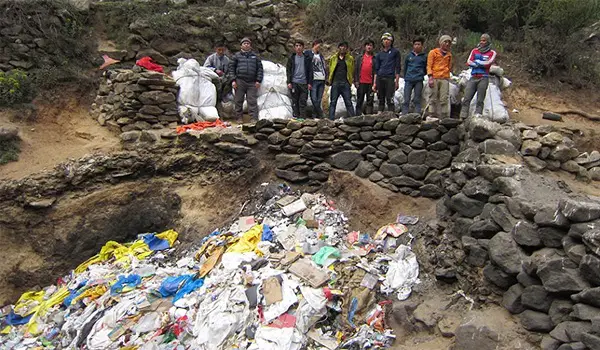Trash Removed From Everest: Efforts to clean up Mt. Everest from the Nepali side of the mountain have yielded an impressive amount of waste this year. According to The Himalayan Times, more than 32,000 kg (70,547 pounds) of garbage was collected and removed from the mountain since the end of the spring climbing season, as the Sagarmatha Pollution Control Committee works to improve conditions on the tallest peak in the planet.
According to the report, most of the garbage was collected in Base Camp and at Camp 2, with 15,442 kg (34,043 pounds) of it being taken to Namche Bazaar for waste management. That trash falls under the “combustable” category, meaning that it can be burned after removable.
A further 2245 kg (4949 pounds) of non-combustable materials was taken to Kathmandu for recycling. An additional 12,995 kg (28,649 pounds) of human waste and 4010 kg (8840 pounds) of kitchen waste were also removed from the mountain.
Much of the garbage was created by the nearly 1000 climbers, Sherpas, and support staff that were on Everest this spring season, making it one of the busiest and most successful years in history. Unsurprisingly, along with an increase in the number of climbers there was more trash on the mountain as well, with the SPCC seeing a dramatic increase over the previous two season.
But, it isn’t all bad news as the efforts to clean up the mountain are paying off. According to SPCC Chairman Ang Dorje Sherpa, Base Camp is now completely free of garbage. Of course, it will only stay that way until next spring, when another herculean clean up effort will take place, but at least things have improved overall.
The goal is to eventually have the entire mountain clean and free from waste and each year the SPCC makes a bit of headway towards achieving that plan.
Just how much progress has been made on Everest in recent years? The Times article quotes UN Environment Patron Ben Fogle, who recently summited the mountain, as saying that the route to the top is now cleaner than the streets of London. All things considered, that isn’t a bad place to be. Hopefully ongoing efforts on the part of the SPCC will continue to improve the situation.
Find out more here.
- Gear Review: The Xero Scrambler Mid is an Ultralight Hiking Shoe for Spring - March 1, 2023
- Gear Review: Yeti Roadie 48 Wheeled Cooler - August 18, 2022
- Kristin Harila Continues Pursuit of 8000-Meter Speed Record - August 16, 2022
